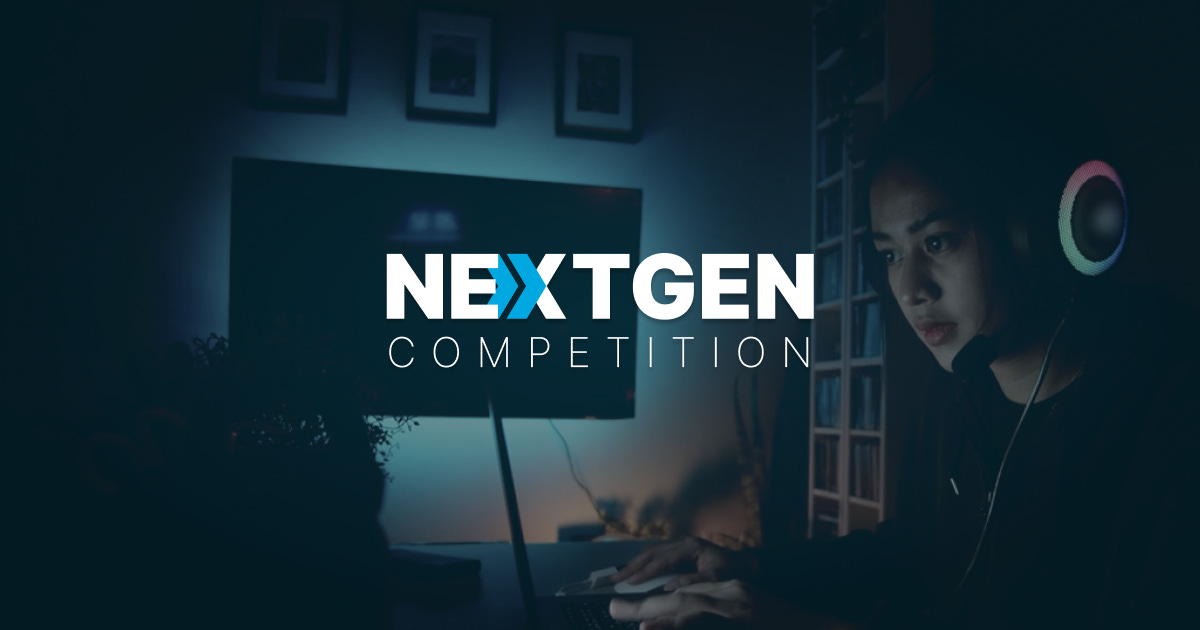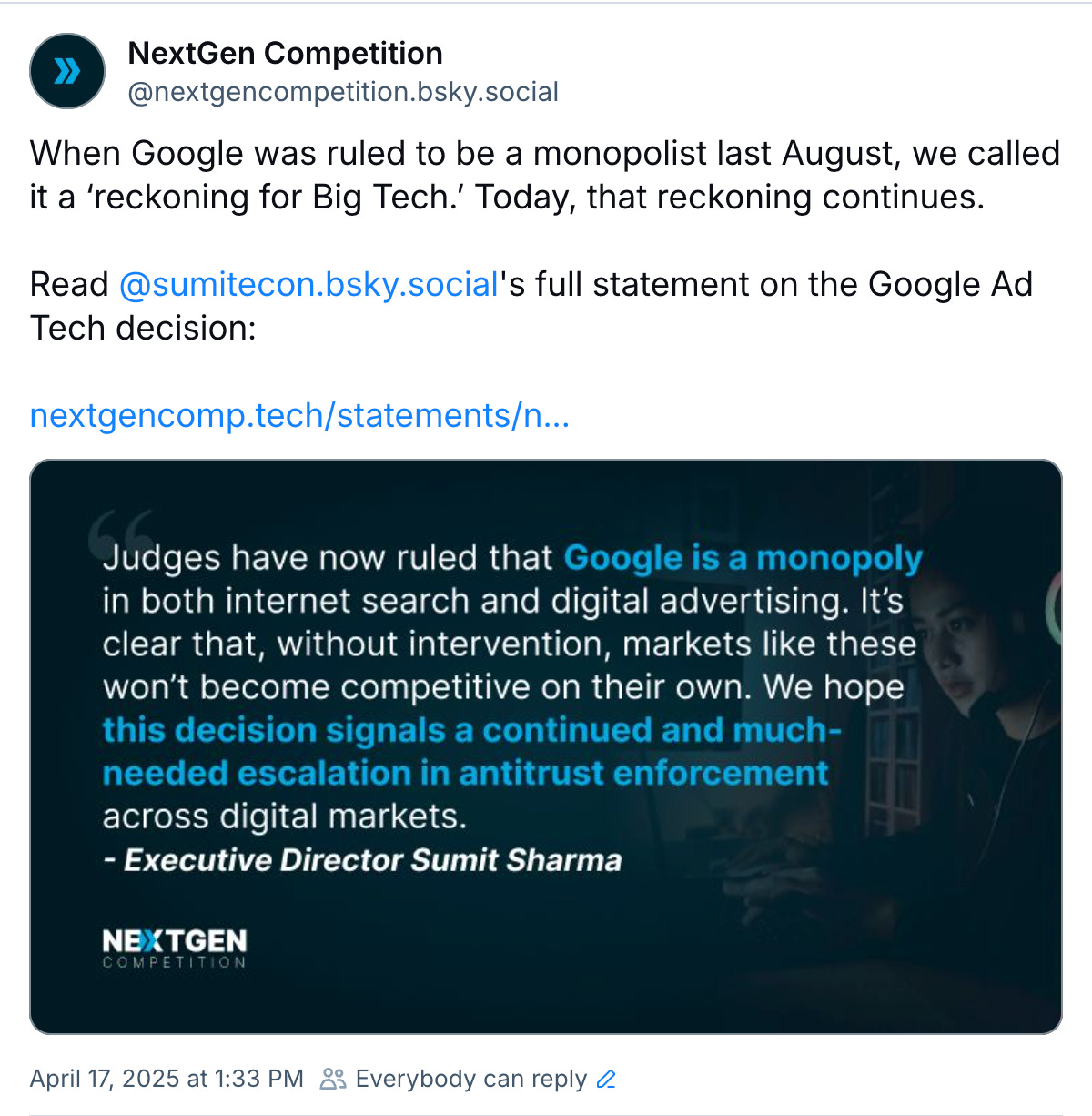Top Hat & Thimble - April 2025
Welcome to NextGen Competition’s newsletter, delivering insider insights on antitrust battles, industry shakeups, AI trends, and more.
Even among the largest technology firms, Meta (owner of Facebook, Instagram, and WhatsApp) stands out as an egregious example of concentrated power and the harms it has caused to individuals.
Meta is controlled by one person—Mark Zuckerberg. Meta’s dual stock ownership structure means that while Zuckerberg owns 13% of Meta’s stock, he controls 61.1% of the voting power. There is no mechanism for shareholders or any external party to demand changes like increased transparency. And without it, Meta can continue to target children and teens without regard to their safety, even after being presented evidence of the abuse caused by its policies. These harms are well-documented, as Jonathan Haidt explains in his book The Anxious Generation.
Moreover Meta’s monopoly in personal social networks is illegally maintained as alleged by the FTC in the ongoing antitrust trial. This monopoly means that there are no checks and balances on Meta’s market power. It can ignore legally binding agreements to protect user privacy and suffer little to no consequences in terms of its profitability or market share.
For example, Meta suffered no meaningful market backlash after the $5 billion fine imposed by the FTC in 2019 for deceiving users about their ability to control the privacy of their personal information or for misleading the European Commission on its ability to combine WhatsApp and Facebook user data. This cavalier attitude continues as Meta introduces new technologies like Digital Companions which can broach inappropriate topics, and engage in sexual conversations with users, including children.
If the FTC succeeds in its ongoing antitrust trial at the D.C. District Court, Meta could be required to divest WhatsApp and Instagram. This would be a welcome first step in checking the inordinate amount of control that Mark Zuckerberg has over our information ecosystem.
But will the FTC and the Courts be allowed to do their jobs without interference? The firing of two Democratic FTC Commissioners and the arrest of a Wisconsin Judge by the current administration are worrying signs. Some Congressional Republicans are also working to kneecap the FTC and take away its competition powers as it takes on not just Meta, but also Amazon.
And of course, Mark Zuckerberg has been lobbying to get a sweetheart deal. Meta changed its content moderation policies to suit the current administration, donated a million dollars to President Trump’s inauguration fund, and Zuckerberg has met with President Trump at least three times this year in an attempt to quash Meta’s antitrust trial.
The collusion between a powerful tech mogul who controls our information ecosystem and an Executive unchecked by Congress is a truly dystopian proposition. We will remain vigilant.
Thank you for reading and your support.
With regards,
Sumit Sharma
Executive Director
NextGen Competition
Zuckerberg’s Control of Meta Even Leaves Musk Envious
Mark Zuckerberg is untouchable—and that’s a problem. Multiple efforts over the years have tried to challenge his control, but his enormous voting power means he is not going anywhere. Even Elon Musk has appeared envious of Zuckerberg’s total and absolute control over Meta.
Meta is unique among Big Tech companies because it has zero checks on its CEO. In 2019, 68% of Facebook’s outside shareholders voted to strip Zuckerberg of his role as chair, but his super-majority voting rights overruled them. That same year, 83% of shareholders tried to end the dual-class system. Again, Zuckerberg overruled them.
Today, the Federal Trade Commission is the last line of defense against a company that is accountable to no one but its founder. This unprecedented level of control means Zuckerberg can:
Unilaterally block mergers, acquisitions, or divestitures without shareholder approval.
Resist regulatory pressure even when the FTC seeks remedies like breaking up the company.
Entrench monopolistic behavior without fear of internal checks, shareholder activism, or meaningful corporate governance.
If regulators fail to act, Meta will continue operating as a sovereign power, unchecked and unaccountable, posing an increasing threat to competition and consumers.
One Unchecked Executive Meets Another
Both Donald Trump and Mark Zuckerberg embody the idea of a unitary executive. They are both individuals who hold near-total control within their respective domains, unchecked by meaningful oversight. In government, this centralization of power threatens the separation of powers. In business, it creates monopolistic structures resistant to accountability.
According to The Wall Street Journal, in a desperate attempt to dodge Meta’s antitrust reckoning, Zuckerberg personally offered a paltry $450 million settlement—a fraction of what the FTC demanded—and spent months cozying up to Trump, donating to his inauguration, settling a frivolous lawsuit, softening content moderation, and even making personal visits to Mar-a-Lago. The goal was simple: buy protection from accountability.
This is what happens when you allow one man to amass unchecked control over a monopoly. Zuckerberg does not answer to shareholders. He does not answer to the public. And if he had his way, he would not answer to regulators either.
Luckily, relentless flattery was not enough to completely derail the rule of law. Thanks to pressure from within the administration and leadership at the FTC, Meta’s day in court has come. But how the administration handles potential penalties remains uncertain.
Lastly, Let’s Talk About Google
This month, a federal judge ruled that Google “willfully engaged in a series of anticompetitive acts” to dominate the digital advertising market. This is a major victory for consumers, publishers, and advertisers harmed by Google's unchecked power.
NextGen Competition Executive Director Sumit Sharma responded, calling the decision “a vindication” and a “much-needed” step toward restoring real competition in digital markets.
Read our full statement here.
Other Competition News
Headlines from the past month you might have missed:
Everything’s Coming Up Sam Altman: OpenAI had a big month: from being valued at $300 billion to several potential new acquisitions like Windsurf and an AI-powered personal device startup, to…building a social network? 😵💫 All signs are pointing to the artificial intelligence behemoth officially taking its place among its Big Tech peers. Its nonprofit roots, and stated mission to put humanity over profits, are clearly a thing of the past.
Speaking of the power of AI, Faisal Rasool certainly isn’t feeling it. In his How-To-Geek opinion piece, he laments the recent tendency for tech giants to “shove” AI into consumers’ products while neglecting to fix bugs in core services, stating:
If you ask these tech giants, they'll tell you AI will make your OS smarter. When your OS can anticipate your needs, it’ll help you get your work done better. Except, most people need an operating system that stays out of their way and lets them get their stuff done. They don’t need a glorified digital assistant to anticipate their every search, mislabel their files, or constantly surveil them. What they need is for Microsoft to fix the million bugs in Windows 11, improve updates, and extend support for older versions that work better.
Did the Big Tech flattery pay off? 🤔 It remains to be seen. But Cecilia Kang of the New York Times indicates the administration’s aggression with tariff threats, funding cuts, immigration crackdowns, and continuing the FTC trial with Meta is all indicative of “an aggressive regulatory stance.”
In an exclusive, The Wall Street Journal has the inside scoop on Mark Zuckerberg’s futile attempt at quashing the FTC’s case. Reportedly, “[he] sounded confident that President Trump would back him up with the FTC” even though he offered way less than the FTC demanded to settle the case.
Despite the lack of payoff, the flattery continues: at the White House Easter Egg Roll, Big Tech logos were on full display. 🐣
Europe vs. Big Tech: The battle between tech giants and the EU continues to heat up, we enjoyed Richard Wennberg’s summary of the growing rift here, where he writes:
Both parties have made their positions clear: Washington has signaled that it will scrutinize regulations it believes disproportionately target US companies or infringe upon free speech, while officials in Brussels have emphasized that although Europe must engage with the White House and take its trade concerns seriously, it should not be pressured into revising laws already adopted by EU lawmakers. Without a balanced and constructive approach to these tensions, the fallout could extend well beyond the tech sector—not only affecting trade, as suggested by the recent tariffs, but also spilling over into other key areas of transatlantic cooperation.
The European Commission fined Apple €500 million and Meta €200 million on April 22, 2025—Apple for not allowing app developers to steer consumers to cheaper offers outside Apple’s app store, and Meta for not transparently offering its users the option to refuse to combine their personal data across Facebook and Instagram.
Other countries outside the EU, such as Japan, have issued their own cease-and-desists targeting Google.
This battle is far from over, as European Commission President Ursula von der Leyen is holding firm, recently stating, “We apply the rules fairly, proportionally, and without bias. We don't care where a company's from and who's running it. We care about protecting people.” Well said. 👏
Biden Antitrust Warriors Keep Legacy Alive: Both Former FTC Chair Lina Khan and Former Assistant Attorney General for Antitrust Jonathan S. Kanter have been making the rounds on CNBC, with Khan addressing the ongoing FTC-Meta trial, calling the tech giant’s tactics a “buy-or-bury scheme,” and Kanter discussing the Google antitrust verdict’s effect on the ad tech world. Both are worth the watch. 🖥️
Bonus read: This short profile on Kanter that his law school alma mater, Washington University, published. In it, he reflects on his DOJ career, giving us this quote: “Competition and freedom go hand in hand.” 🔥
Big Tech, Big Impact: We’ve talked previously about the ill-effects of the recent insatiable demand for energy from tech giants. Well, those data centers could be siphoning water from some of the driest parts of the world, according to a wide-ranging article from The Guardian and an analysis from the nonprofit organization SourceMaterial.
Aurora Gómez, whose effort “Tu Nube Seca Mi Río” (“Your cloud is drying my river”), said it best in the piece: “Neither people nor data can live without water,” said Gómez. “But human life is essential and data isn’t.”
Maybe Big Tech should look to their own past environmental commitments for guidance on how to develop AI responsibly, but we’re not holding our breath.
Local News Lifeline: Oregon is considering making Big Tech front the cost to local journalists and news organizations, with advocates saying the effort “would be a financial lifeline for newsrooms across the state while requiring tech companies to compensate publishers for profiting off of their locally generated content.”
It’s a fraught move – Canada attempted something similar in 2023, and Meta retaliated by blocking news from its platform altogether and allowing the proliferation of partisan pages, cryptocurrency scams, and ads on Facebook and Instagram that mimic legitimate news sources. The New York Times also reports that research shows that only one in five Canadians knows that news has been blocked on Facebook and Instagram feeds.
Big Tech has shown that it’s willing to play hard ball in the face of any efforts to change its behavior.
Until next month! In the meantime, follow us on X and BlueSky for the latest on Big Tech, AI, and antitrust. ⚖️



